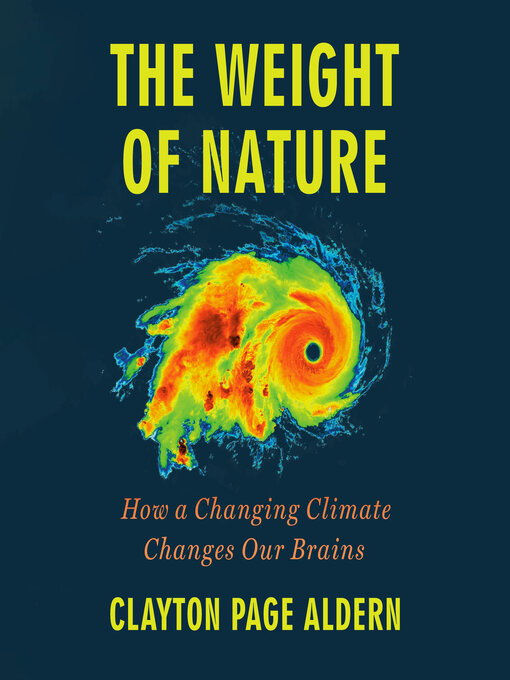- Popular ebook fiction
- Truth and Reconciliation in Canada
- MMIWG
- Mental Health
- Canadian Indigenous Voices
- February Romance 2024
- Canada Reads 2024 longlist
- Black History Month 2024
- Freedom to Read Week 2024
- February - I love to read month
- Indigenous History (Fiction)
- Library Management and Policies
- Library Policies
- See all
-
Description
-
Creators
-
Details
-
Reviews
A Next Big Idea Club Must-Read Book
A Behavioral Scientist’s Summer Book List Pick
A Sierra Magazine Must-Read Book
A deeply reported, eye-opening book about climate change, our brains, and the weight of nature on us all.
The march of climate change is stunning and vicious, with rising seas, extreme weather, and oppressive heat blanketing the globe. But its effects on our very brains constitute a public-health crisis that has gone largely unreported. Based on seven years of research, this book by the award-winning journalist and trained neuroscientist Clayton Page Aldern, synthesizes the emerging neuroscience, psychology, and behavioral economics of global warming and brain health. A masterpiece of literary journalism, this book shows readers how a changing environment is changing us today, from the inside out.
Aldern calls it the weight of nature.
Hotter temperatures make it harder to think clearly and problem-solve. They increase the chance of impulsive violence. Immigration judges are more likely to reject asylum applications on hotter days. Umpires, to miss calls. Air pollution, heatwaves, and hurricanes can warp and wear on memory, language, and sensory systems; wildfires seed PTSD. And climate-fueled ecosystem changes extend the reach of brain-disease carriers like mosquitos, brain-eating amoebas, and the bats that brought us the mental fog of long COVID.
How we feel about climate change matters deeply; but this is a book about much more than climate anxiety. As Aldern richly details, it is about the profound, direct action of global warming on our brains and behavior—and the most startling portrait yet of unforeseen environmental influences on our minds. From farms in the San Joaquin Valley and public schools across the United States to communities in Norway’s Arctic, the Micronesian islands, and the French Alps, this book is an unprecedented portrait of a global crisis we thought we understood.

- Clayton Page Aldern - Author
- Clayton Page Aldern - Narrator
OverDrive Listen audiobook
- ISBN: 9780593827437
- File size: 259778 KB
- Release date: April 9, 2024
- Duration: 09:01:12
MP3 audiobook
- ISBN: 9780593827437
- File size: 259816 KB
- Release date: April 9, 2024
- Duration: 09:10:05
- Number of parts: 10

Loading
Formats
OverDrive Listen audiobook
MP3 audiobook
subjects
Languages
English
